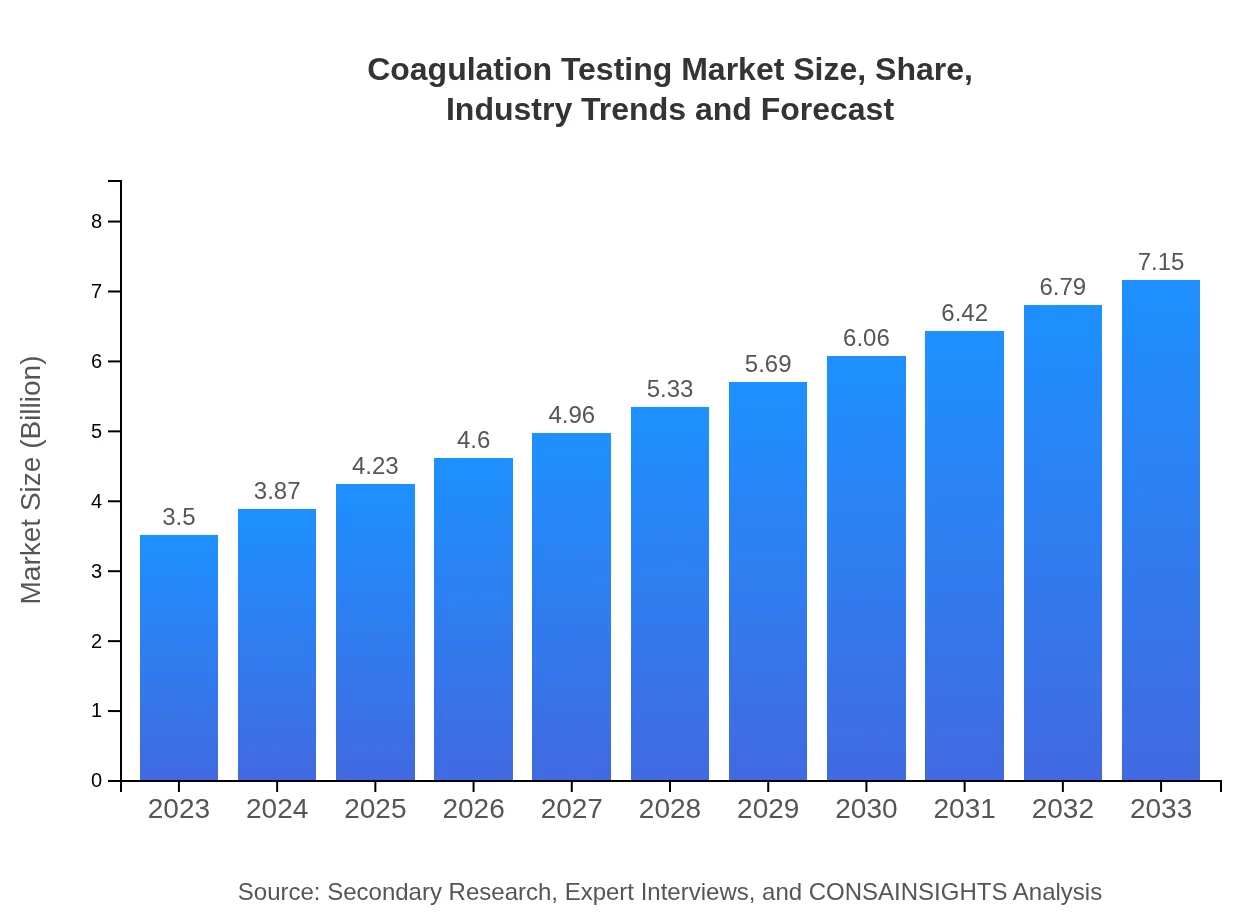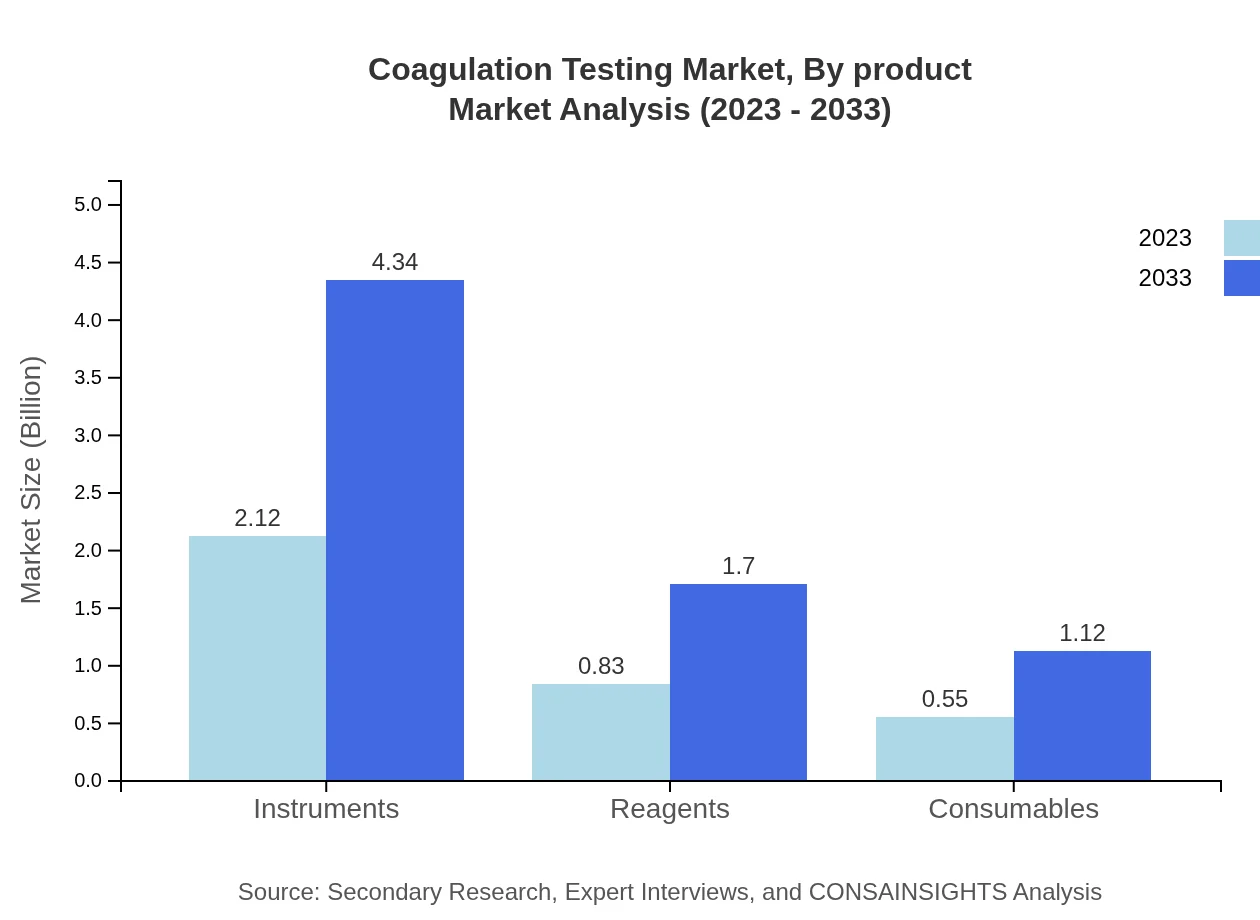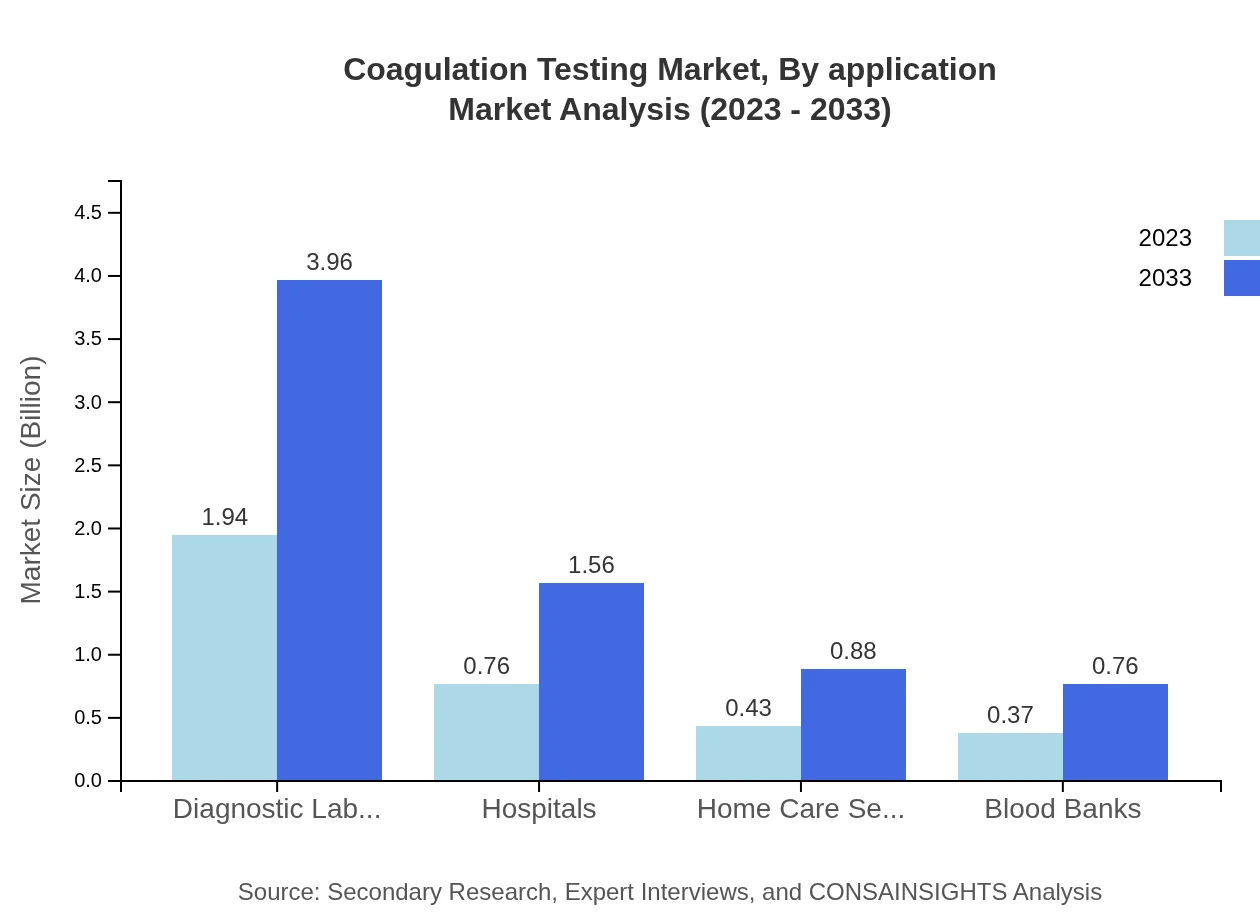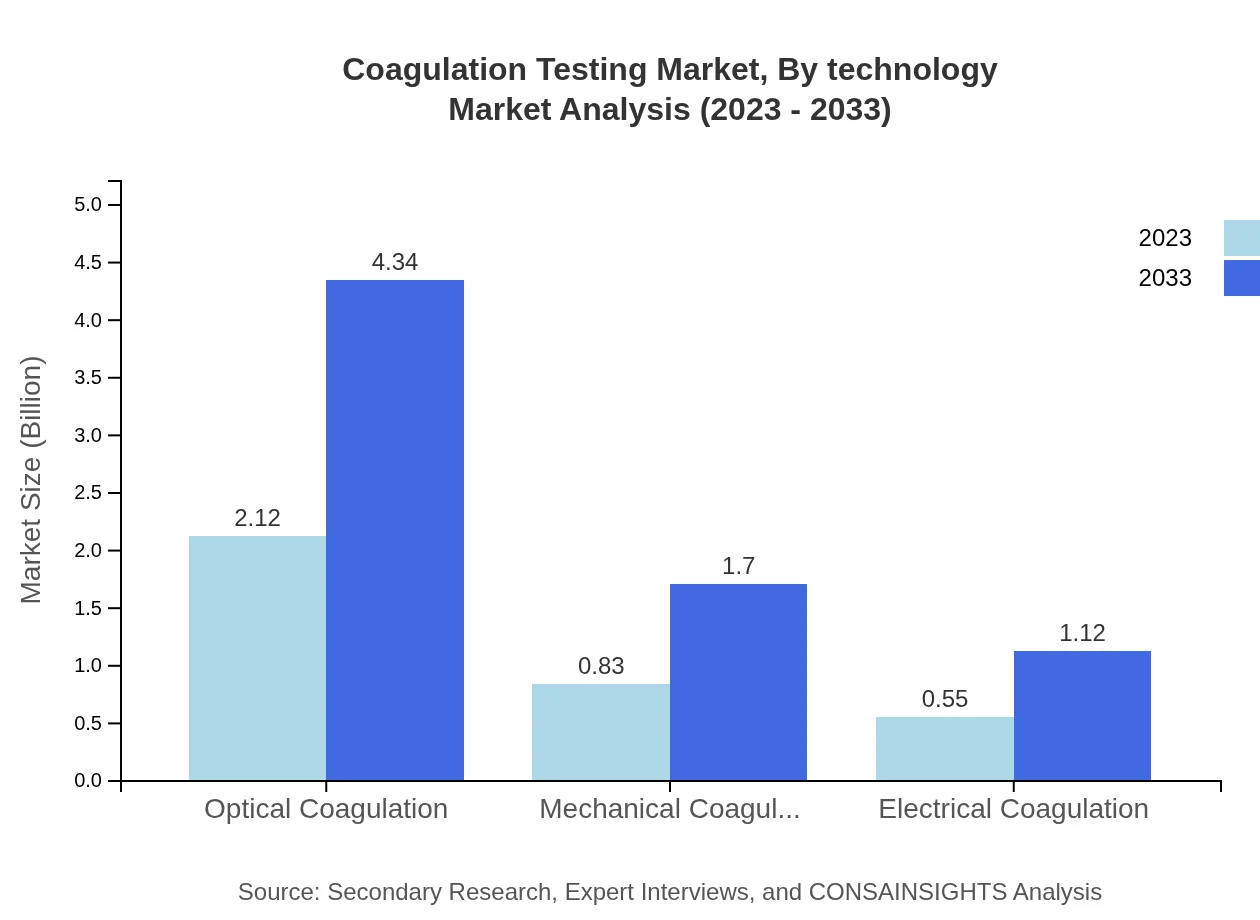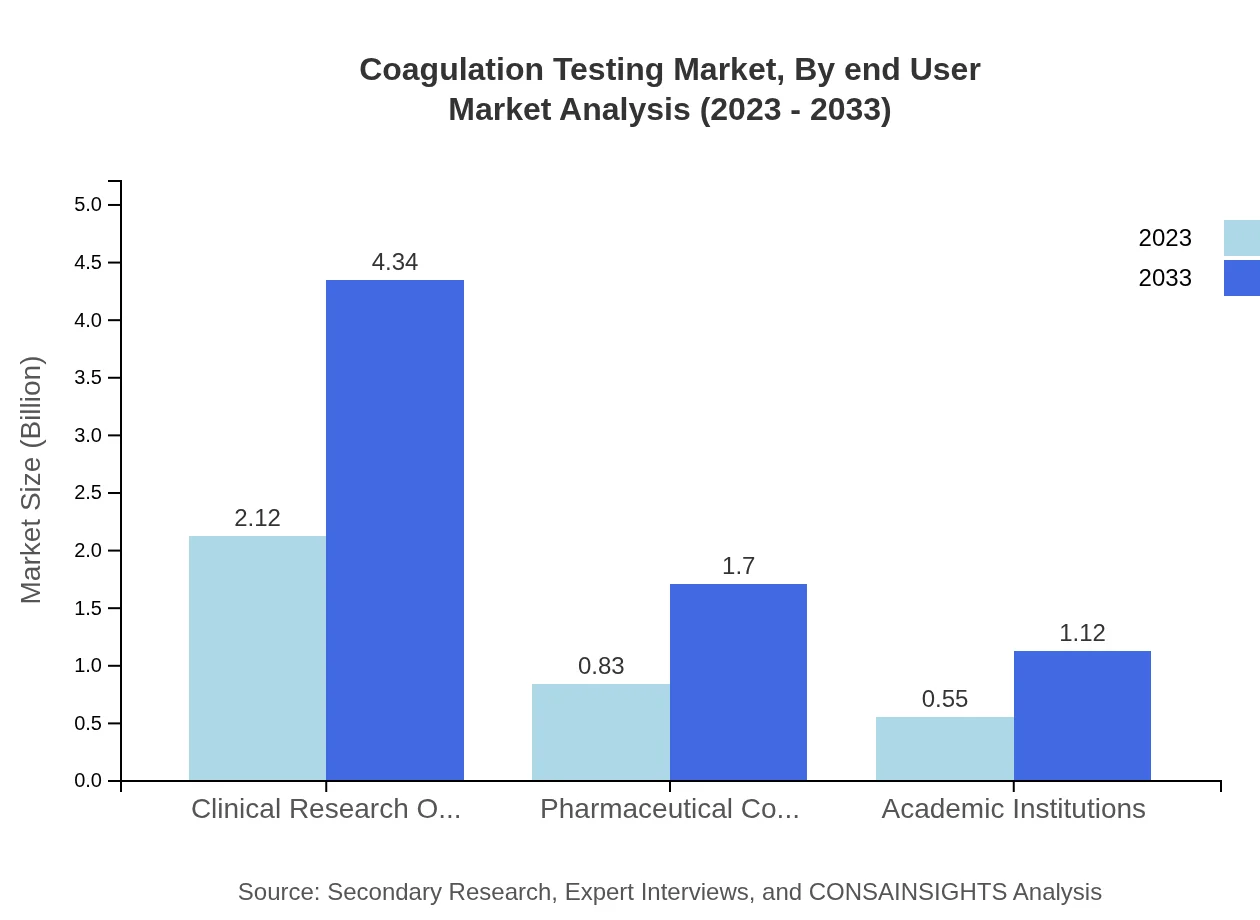Coagulation Testing
Published Date: 31 January 2026 | Report Code: coagulation-testing
Coagulation Testing Market Size, Share, Industry Trends and Forecast to 2033
This report presents an in-depth analysis of the coagulation testing market from 2023 to 2033. It includes trends, market size, growth rates, segment analysis, and regional insights, providing a comprehensive outlook on the industry's future dynamics.
| Metric | Value |
|---|---|
| Study Period | 2023 - 2033 |
| 2023 Market Size | $3.50 Billion |
| CAGR (2023-2033) | 7.2% |
| 2033 Market Size | $7.15 Billion |
| Top Companies | Abbott Laboratories, Sysmex Corporation, Roche Diagnostics, Siemens Healthineers, Thermo Fisher Scientific |
| Last Modified Date | 31 January 2026 |
Coagulation Testing Market Overview
Customize Coagulation Testing market research report
- ✔ Get in-depth analysis of Coagulation Testing market size, growth, and forecasts.
- ✔ Understand Coagulation Testing's regional dynamics and industry-specific trends.
- ✔ Identify potential applications, end-user demand, and growth segments in Coagulation Testing
What is the Market Size & CAGR of Coagulation Testing market in 2023?
Coagulation Testing Industry Analysis
Coagulation Testing Market Segmentation and Scope
Tell us your focus area and get a customized research report.
Coagulation Testing Market Analysis Report by Region
Europe Coagulation Testing:
Europe is expected to witness a market growth from $1.08 billion in 2023 to $2.21 billion by 2033. The region benefits from robust regulatory frameworks and a high demand for diagnostic tests among health professionals.Asia Pacific Coagulation Testing:
The coagulation testing market in the Asia Pacific region is expected to grow from $0.66 billion in 2023 to approximately $1.34 billion by 2033, driven by increased investments in healthcare infrastructure and a rising awareness of health disorders.North America Coagulation Testing:
In North America, the market is anticipated to grow from $1.25 billion in 2023 to $2.56 billion by 2033, supported by high prevalence of coagulation disorders and the presence of advanced healthcare institutions and infrastructure.South America Coagulation Testing:
Market growth in South America is projected from $0.22 billion in 2023 to $0.46 billion by 2033, influenced by increasing healthcare expenditures and demand for advanced medical technologies in the region.Middle East & Africa Coagulation Testing:
The Middle East and Africa region's market will likely grow from $0.29 billion in 2023 to $0.59 billion by 2033, propelled by improving healthcare systems and increased investments in laboratory infrastructure.Tell us your focus area and get a customized research report.
Coagulation Testing Market Analysis By Product
In 2023, the Coagulation Testing instruments market size is expected to be $2.12 billion, growing to $4.34 billion by 2033. Reagents are also significant, starting at $0.83 billion in 2023 and reaching $1.70 billion by 2033. Consumables are expected to expand from $0.55 billion to $1.12 billion in the same timeframe.
Coagulation Testing Market Analysis By Application
The major applications include clinical testing in diagnostic laboratories and hospitals. Diagnostic laboratories contribute substantially with a market size of $1.94 billion in 2023, projected to rise to $3.96 billion by 2033. Hospitals are also lucrative, starting at $0.76 billion in 2023 and expanding to $1.56 billion.
Coagulation Testing Market Analysis By Technology
The market is divided into mechanical, electrical, and optical coagulation methods. The mechanical method holds a significant portion, projected to grow from $0.83 billion in 2023 to $1.70 billion by 2033. Electrical methods, while smaller, are gaining traction with a projected increase from $0.55 billion to $1.12 billion.
Coagulation Testing Market Analysis By End User
The end-user segment is diversified, encompassing hospitals, diagnostic laboratories, blood banks, and home care settings. Each user type is critical, with diagnostic labs expected to dominate in market size over the next decade.
Coagulation Testing Market Analysis By Region
Global Coagulation Testing Market, By Region Market Analysis (2023 - 2033)
Regional performance varies with North America leading in market size. Europe and Asia Pacific show robust growth potential, driven by technological advancements and increasing healthcare demands.
Coagulation Testing Market Trends and Future Forecast
Tell us your focus area and get a customized research report.
Global Market Leaders and Top Companies in Coagulation Testing Industry
Abbott Laboratories:
A leading global healthcare company that develops and markets a wide range of tests, including coagulation testing products known for their innovative technology and reliability.Sysmex Corporation:
Renowned for its comprehensive coagulation testing solutions, Sysmex leverages advanced analytical instruments to provide effective diagnostic solutions.Roche Diagnostics:
A premier biotechnology company that offers a wide spectrum of innovative coagulation testing products, helping to enhance patient management and treatment.Siemens Healthineers:
Providing a diverse range of coagulation testing instruments, Siemens is known for its strong R&D investment that results in cutting-edge medical technologies.Thermo Fisher Scientific:
Offers a variety of coagulation testing products and is known for its commitment to advancing healthcare through innovative technologies.We're grateful to work with incredible clients.









FAQs
What is the market size of coagulation testing?
The global coagulation testing market is valued at approximately $3.5 billion in 2023, with a projected CAGR of 7.2% leading to significant growth by 2033.
What are the key market players or companies in the coagulation testing industry?
Key players in the coagulation testing market include Abbott Laboratories, Siemens Healthineers, Roche Diagnostics, and Hemostasis products companies, who are crucial for developments and innovations in testing technologies.
What are the primary factors driving the growth in the coagulation testing industry?
Growth is primarily driven by the rising prevalence of blood disorders, advancements in testing technologies, and increasing demand for rapid diagnostic procedures, alongside heightened awareness of health and disease management.
Which region is the fastest Growing in coagulation testing?
The Asia Pacific region is the fastest-growing market for coagulation testing, expected to increase from $0.66 billion in 2023 to $1.34 billion by 2033, fueled by healthcare advancements and rising populations.
Does ConsaInsights provide customized market report data for the coagulation testing industry?
Yes, ConsaInsights offers customized market report data for the coagulation testing industry, allowing clients to tailor the information based on specific requirements and emerging market trends.
What deliverables can I expect from this coagulation testing market research project?
Deliverables include comprehensive market analysis, trend reports, competitor evaluations, segment performance data, and insights tailored to your strategic needs in the coagulation testing market.
What are the market trends of coagulation testing?
Current trends include increased automation in labs, growth in point-of-care testing, integration of AI for predictive analysis, and demands for personalized medicine which shapes the future of coagulation testing.

